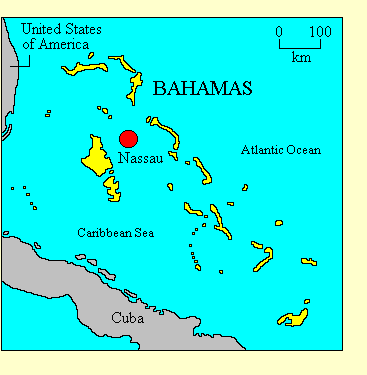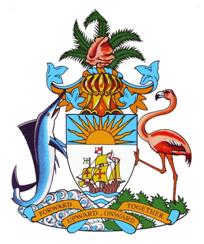

COMMONWEALTH OF
THE BAHAMAS
• Official name: Commonwealth of the Bahamas
• Location: Caribbean
• International organisations: The African, Caribbean and Pacific Group of States, The Commonwealth of Nations,
The Non-Aligned Movement, The Organisation of American States, The United Nations, The World Trade Organisation
• Borders: None
• Coastline: Atlantic Ocean, Caribbean Sea
• Land area: 13,940 Km2
• Population: 330,000
• Annual GDP (PPP) per capita: US$29,800 (2009 CIA estimate). World ranking: 33
• Ethnicity: African descent 85%, European descent 12%, Indian and others 3%
• Languages: English is the official language and is generally understood. Most of the population speaks Bahamian Creole.
• Religion: About 75% of the population are Protestant Christians and about 20% are Catholic Christians.
• Form of government: Constitutional monarchy and parliamentary democracy. The Bahamas is divided into 21 districts.
• Capital: Nassau
• Constitution: The
Constitution of the Commonwealth of the Bahamas came into effect on 10 July 1973.
• Head of state: Queen Elizabeth II, Queen of the Bahamas. The Queen came to the
British throne on 6 February 1952, and has held the title Queen of the Bahamas since
10 July 1973. The Queen's functions in the Bahamas are excercised by a Governor-General,
appointed by the Queen on the advice of the Prime Minister. The current Governor-General,
Sir Arthur Foulkes, took office on
14 April 2010.
• Head of government: The Prime Minister, appointed by the Governor-General. The Prime Minister is the
leader of the largest party in the legislature and is accountable to it.
• Legislature: The Bahamas has a bicameral legislature, the Parliament.
The House of Assembly has 40 members, elected for five-year terms from single-member
constituencies. The Senate has 16 members appointed by the government.
• Electoral authority: The Parliamentary Registration Department conducts national elections.
• Freedom House 2011 rating: Political Rights 1, Civil Liberties 1
• Transparency International Corruption Index: no rating given
• Reporters Without Borders Press Freedom 2010 Index: no rating given
• Heritage Foundation Economic Freedom 2010 Index: 68.0% (46 of 178 countries rated)

Political history
Columbus made his first landfall in the Americas at San Salvador Island in 1492.
English settlement began in 1647 and the islands became a British Crown Colony in 1717.
English planters resettled the islands with African slaves brought from the United States.
The abolition of slavery in 1834 brought a decline in population and the territory
became a backwater whose main industry was smuggling.
Constitutional development began after the Second World War and internal
self-government was achieved in 1964, with independence following in 1973. Pre-independence
politics was dominated by the European-led United Bahamian Party. But the
Progressive Liberal Party, which
represented the African-descended majority, won office in 1967 and led the country to
independence.
The main opposition party is the
Free National Movement, formed from
the old UBP and some PLP dissidents. Dissatisfaction with the long and
increasingly corrupt rule of the PLP leader Sir Lynden Pindling allowed the FNM, led by
Hubert Ingraham, to win the 1992 elections.
The PLP returned to office under Perry Christie in 2002, but at the 2007 election Ingraham and the FNM had a big victory.
Updated October 2011
|

